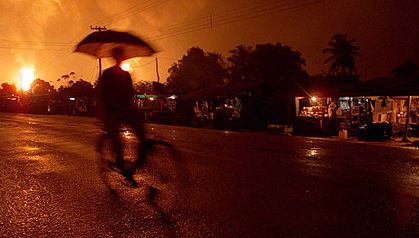Ben Okri’s dreamlike tale of post-colonial Nigeria has many fans, but for me it was a long nightmare
Dream sequences aren’t always the worst parts of films or books. They just normally are. There may be moments of mind-warping genius in films like Orphée and Twin Peaks but these are more than offset by hours of tedium. Bouncer’s dream; the entire season of Dallas that didn’t matter anymore because it was all Pam’s nightmare … Those are just the tip of an especially numbing iceberg. And as Stuart Evers has already pointed out round these parts, it’s even worse in novels. There’s no tension in dreams. No reason to care. Any problem can be reversed or forgotten in one flash of exclamation-mark-heavy writing. Logic has flown out of the window, anything can happen and so nothing actually matters.
The Famished Road is 574 pages of the worst kind of dream sequence. Five hundred-and-seventy-four long pages. A burden that seems especially cruel given that pretty much everything you need to know about it is expressed in its first paragraph:
“In the beginning there was a river. The river became a road and the road branched out to the whole world. And because the road was once a river it was always hungry.”
I know that this is Marmite writing. Some people clearly love it as much as I hate it. It won the Booker, after all. But if you’re like me, you’re probably wondering: “How did the river become a road? Why does being a river make anything hungry? Isn’t this a cheap attempt to import the rhythms of the King James Bible to create a feeling of gravitas? And who actually gives one?”
Meanwhile, there are thousands untroubled by such logic, who feel real connection with Okri’s opaque mysticism and have eaten this stuff up. And if you are lucky enough to be one of them, perhaps you might be able to tell me what this means: “Outside the wind of recurrence blew gently over the earth”? Perhaps also you can give me an explanation of why it’s worth investing any emotional energy in Okri’s “spirit child” Azuro when his world is governed by such arbitrary forces. He’s decided to stop eating? Don’t worry, he’ll sleep for a “long time” and a spirit will challenge him and of course he’ll come back. His father has been injured in a fight? Don’t worry, he’ll sleep for a “long time” and a spirit will challenge him and of course he’ll come back. Madame Koto, the local bar owner has been cruel to him? Don’t worry, in the next chapter she’ll be round with a herbalist and doing everyone a big favour. There’s a blind man in a wheelchair playing music that’s driving everyone mad? Don’t worry, someone will hit him, or drag him out or maybe everything will just change at a click of the fingers … Or with the arrival of another kind of spirit.
These spirits are especially painful. They appear and disappear with no rhyme or reason but plenty of overripe prose. “Their eyes were deep and dull and confusing … They radiated a potent and frightening dignity … The redness hurt me all over and then it changed, astonishingly, to a ravishing golden hue with a shimmering of golden lights.”
Meanwhile, that “astonishingly” is a key word in the book. Or variations. Most notably we often hear the phrase “The strangest thing happened.” The cumulative effect of such repetitions is that such things very quickly stop feeling strange or astonishing. They feel boring. I had the impression that I was going over the same ground again and again. Because I was. For all of Okri’s furiously excited adjectives, this is a book in which hardly anything of note occurs.
To give the author some credit, there is at least a message behind The Famished Road. The chaos and confusion of the book certainly provokes reflection on post-colonial Nigeria, where it is set. The anger against “white people” also burns, even if presented with a typical lack of subtlety:
“They forgot that we are all brothers and sisters and that black people are the ancestors of the human race. They are greedy. They want to own the whole world and conquer the sun … They are not all bad. Learn from them but love the world.”
Elsewhere, there is a certain sonority to his best writing and his lush prose also gives a powerful impression of a land teeming with life. There are also a few decent descriptions of the fights that Azuro’s dad gets into with various improbable opponents. Even though it’s obvious from the outset that some random event or “gathering of strength” will always grant the father victory. Even if, also, these sequences are plagued by bad writing:
“His laughter stiffened into a mask of pain. Blood appeared on his mouth … The crowd gasped. The loudspeaker fell silent.”
I can just about allow the laughter to flip over into a visual feature. But why on earth would a loudspeaker stop except to generate a cheap effect? Such flourishes make it hard not to feel that Okri is wasting my time. Wasting a lot of it in this great slab of dreamy-nonsense. Personally, I’m amazed that the judges even finished the thing, let alone decided to give it the prize. But I know others feel differently. The book moves ever closer to classic status, and there remain thousands of people around the world who love it. Can you explain why?
Posted by Sam Jordison Thursday 20 January 2011 13.46 GMT guardian.co.uk
See online: Booker club: The Famished Road

